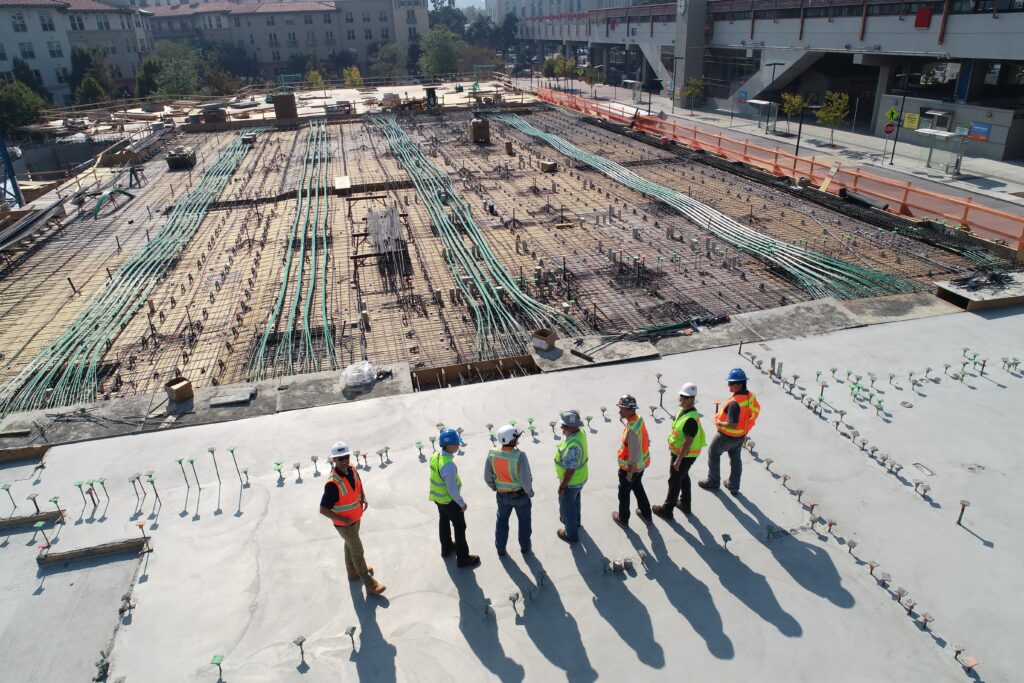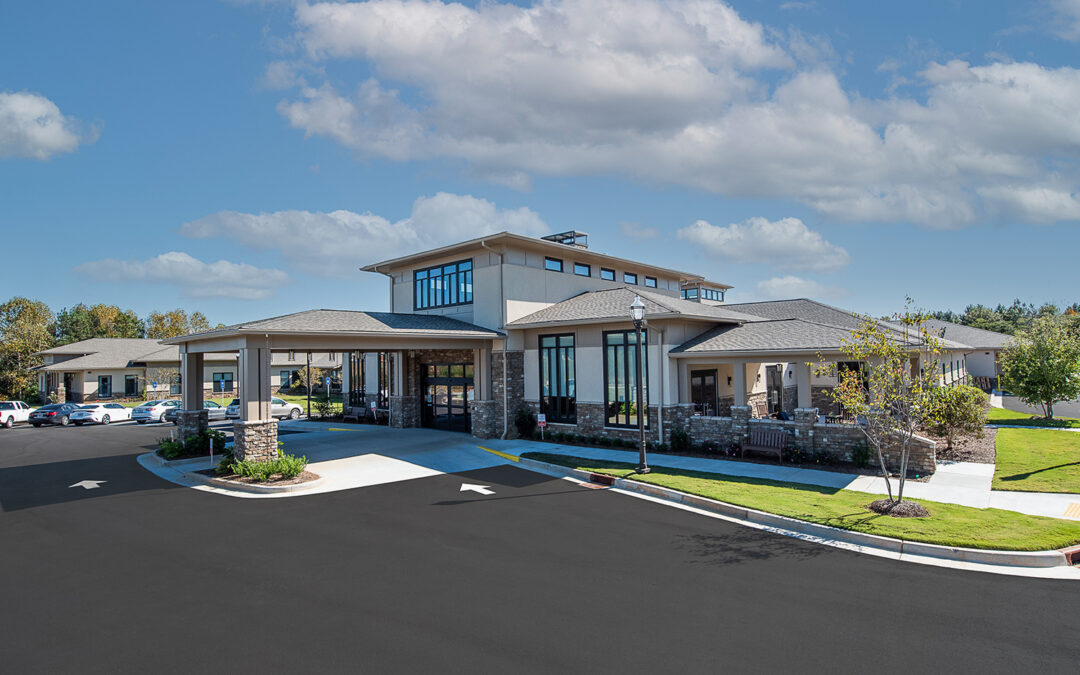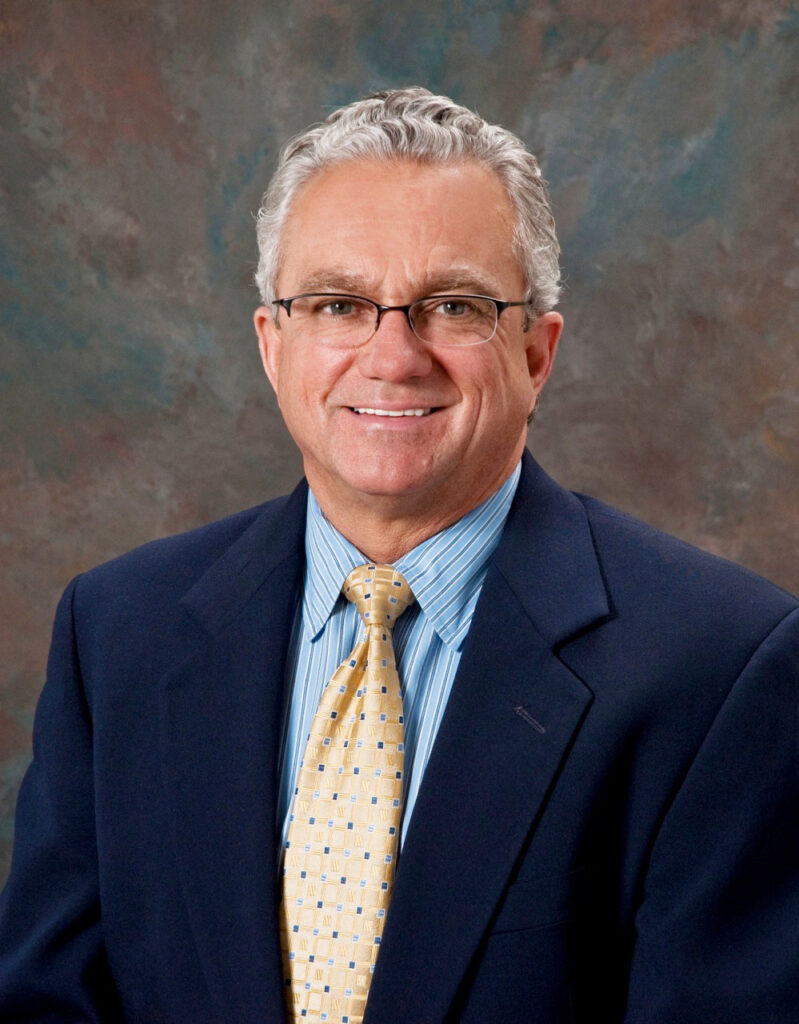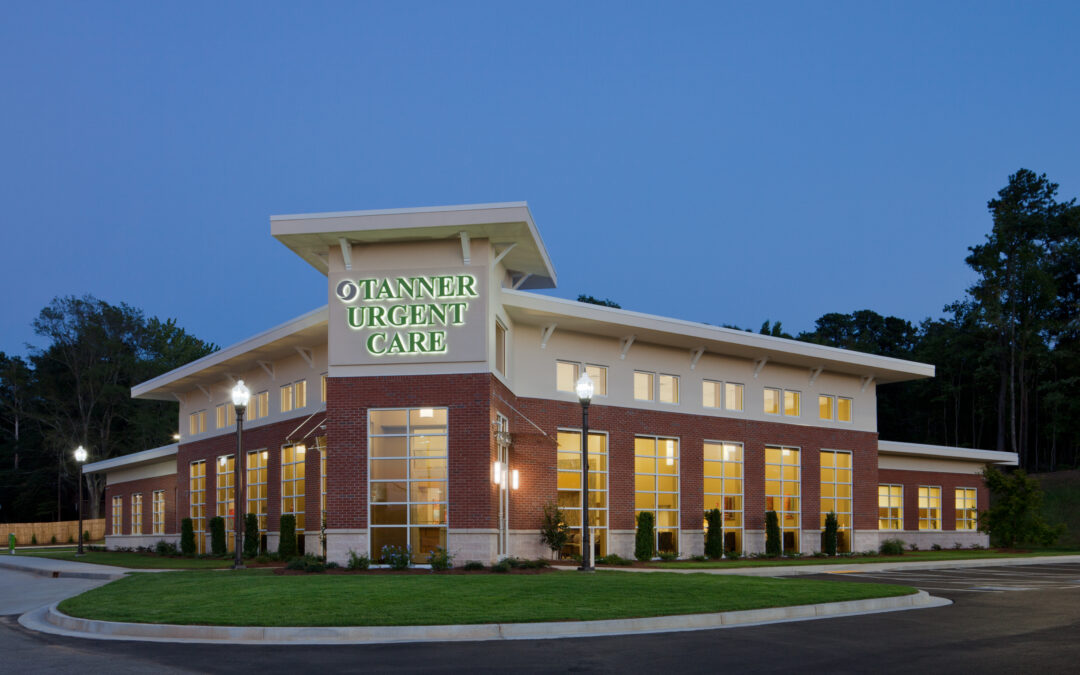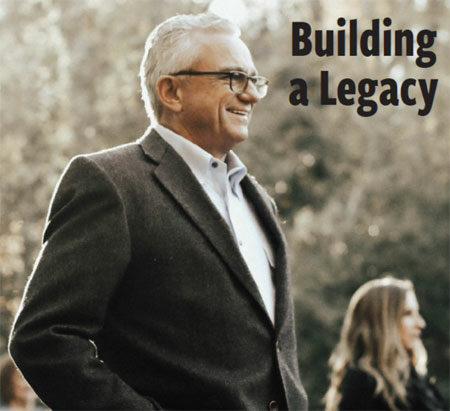
Aug 1, 2020
Randall Redding is no stranger to awards and accolades. The 65-year-old CEO of R. K. Redding Construction (RKR) in Bremen, Ga., has pursued a level of excellence that is unsurpassed over the 29 years that he has owned the business.
RKR is licensed in six states and specializes in the new construction and renovations of medical facilities, schools, universities, and more. In addition to being the CEO of RKR, he is the CEO of Mill Town Music Hall, a popular country music venue also located in Bremen.
Randall’s most recent recognition includes receiving the 2019 Bremen Junior Women’s Club Citizen of the Year award on Nov. 7, 2019; he and his wife, Tena, were awarded the Carroll County Chamber Business of the Year Award for Mill Town Music Hall in March; and on June 12, 2020, he was named as the recipient of the prestigious Associated General Contractors of Georgia (AGC Georgia) Skill, Integrity & Responsibility (SIR) Award.
AGC Georgia, is the leading association for the construction industry. The annual SIR Award recognizes deserving individuals who have shown a lifetime of exemplary service and have made substantial contributions to the AGC organization, the construction industry and to their community.
Always humble, Randall has never been one to seek out recognition for himself. Instead, he is quick to share that it’s a team effort. “I appreciate that. They are very kind to recognize me,” he says. “It recognizes our family and our businesses. We all work together, so whenever they honor me, they honor everyone.”
Raised on Faith
Randall was born and raised just outside of Bremen and attended school in Buchanan through the sixth grade. In the seventh grade, he switched schools and went to school in Bremen until he graduated in 1973.
His mom and dad raised him in a Christian home – his dad was a Baptist minister who started Calvary Baptist Church in Bremen – a church that is still active today. The first four members of Calvary Baptist were his parents, Randall, and his sister.
His parents were also owners of the M&W Cafe in Bremen.
The City of Bremen was once called the “Clothing Center of the South” due to the men’s suits that were made and shipped across the United States. Famous leaders such as Bear Bryant and President Jimmy Carter would buy their clothes in Bremen.
During the clothing industry’s peak in the 1970s, there were approximately 2,500 Bremen residents – mostly women – who worked in the clothing manufacturing plants, according to West Georgia Textile Heritage Trail. The majority of the city’s clothing manufacturers closed in the 1980s and 1990s due to the falling profits caused by foreign competition and the passage of the North American Free Trade Agreement (NAFTA) in 1994.
“In Bremen’s heyday, everyone ate in that restaurant,” says Randall. “I helped my parents by wiping down tables, bussing tables, and serving coffee and tea – taking care of the people who worked in the plants, the executives and industrial leaders who ate there.”
A Building Background
Randall’s great-grandfather had been a self-taught architect and was an accomplished builder in the area. Randall’s grandmother would often talk about her father’s work and would take Randall to see some of the buildings and homes his great-grandfather had built.
Randall had a wonderful relationship with his grandparents on his mother’s side. They were both very active, planted a garden each year, and loved being outdoors – things Randall enjoyed as well.
His grandfather would find scrap wood, and he would bring it to Randall for his building projects. His grandmother would give Randall quarters to go next door to the country store to buy nails.
“I’d build things in the back yard and in trees on our farm, and she would come out and inspect them and sit in the hut with me for a while,” he says. “That’s how I fell in love with building as far back as I can recall. They were both very inspirational to me. I loved them and loved staying at their home as much as my parents would let me.”
By the time Randall reached the seventh grade, he had pretty much decided he was going to work in the construction industry. “That’s what I really wanted to do with my life,” he says. “I’ve always felt it was my calling to be a contractor.” He began to work construction jobs in the summertime while continuing to help his parents in the restaurant.
Learning The Hard Way
When Randall and his longtime friend, Robin Worley, graduated high school, Robin was planning on going to Auburn University and wanted Randall to go with him. But college wasn’t something that Randall’s family had ever discussed. No one in his family had ever attended college.
“It wasn’t that college wasn’t important,” he says. “It just wasn’t talked about in our home. So, I didn’t prepare by taking the right courses in high school.”
This would prove to be a challenge that young Randall would be almost unable to overcome.
Set on going to Auburn with Robin, Randall applied to the School of Architecture. Because he had not taken the prerequisite courses in high school that he needed to get into the program, Auburn sent him a letter declining his application a few weeks later. He was upset, but determined, and went to see one of those industrial leaders he knew from working at the M&W Cafe. This man was a large contributor to Auburn, and the athletic building had been named after him.
After Randall told him about his plight, the businessman immediately had his secretary call the president of Auburn, Harry M. Philpott. The man told Harry he had watched Randall grow up in the restaurant, that he was a hard worker and he knew Randall was going to be successful – they just needed to give him a chance.
“He hung up the phone and said, ‘Now listen, you’re going to be admitted into building technology,’ which I didn’t even know existed but it was exactly what I needed to be in,” Randall explains. “Then he told me, ‘Now, you don’t get that many breaks in life – make the most of this.'”
Randall told him he would do his very best to make him proud.
“So, I got in, but I was not qualified,” he laughs. “And I quickly figured that out. I was so far behind not taking the math courses, and frankly, it was an engineering degree.”
When Robin and Randall first began attending college, they both tried out for their favorite college sports, hoping to walk on the teams. Football for Robin, wrestling for Randall. During this time, the SEC (Southeastern Conference) included college wrestling.
When Randall was a sophomore in high school, Bremen started a wrestling program. He wrestled for three years and helped bring home the state championship during his senior year – Bremen’s first state championship on record. His decision to try out for the Auburn wrestling team was influenced by Coach “Sonny” Dragoin, Auburn’s head golf coach.
“Coach Dragoin was at our awards banquet and he said to me, ‘I hear you’re going to Auburn. You need to walk on the wrestling team.’ So, I just kind of took it as that’s what I needed to do,” says Randall. “My college roommate Robin walked on the football team and I walked on the wrestling team.”
Auburn’s wrestling coach was a legend, and Randall was honored to earn a spot on the team. “I worked hard to get on that team,” he says. “I worked with all the first string athletes to push them as much as I could to make them better. That was my job.”
He wrestled for two years for Auburn, but during his sophomore year, he was having difficulty trying to catch up on learning the prerequisite math while taking his regular coursework and juggling wrestling at the same time. He knew he would have to stop wrestling. He also had an unsettling encounter with one of his college professors during this time that would change the course of his life.
One day, during a lab class, the college professor tapped Randall on the shoulder and told him to come into his office. He pushed a piece of paper across the desk and told Randall to sign. It was a transfer out of the building technology program.
“I asked him, ‘What is this about?’ says Randall. “The professor said, ‘You have to sign this because you have to leave building technology and get into another degree.’ I told him, ‘No. I’m a builder,’ and he said, ‘No, no, no. You’re not a builder. I’ve never seen anyone less qualified to be a builder than you. I refused to sign. He was screaming at me, but I just got up and went back into the class.”
Randall made a C in that class, but it was the last one he would ever make “He built a fire under me, and I was determined,” he says. “I started working about eight hours a day studying.” A close friend took Randall under his wing and tutored him in math, science, and physics. From that point on, he made the Dean’s list every quarter.
“I appreciate that professor,” he shares. “He actually inspired me. I needed that wake-up call and the extra incentive. I fell in love with learning and studying. It was no stretch for me to study until four in the morning. Once that world opened up for me, then I got all over it and did well there. I loved it.”
Along with his rigorous studying, Randall worked for a home builder during his junior and senior years. He graduated college in 1976 and received an A-plus on his thesis – something the thesis jury rarely gave.
First Love
Randall met his first wife, Cindy, in high school, and they began dating when he finished college. In 1978, they were married and had a son, Randall Keith Redding Jr., (Keith) in 1982. After only 10 years of marriage, the couple was shocked to learn in August 1988 that 31-year-old Cindy had breast cancer. She battled the disease, went into remission and they went on with their lives.
In college, Randall had always dreamed of owning his own construction company. After working for other companies for several years, he and Cindy made the decision to start their own, and RKR was born in 1991. RKR had two employees at first – Randall and Cindy. Then, as they began landing some contracts, Tony and Debbie Lovvorn came on board to help build the company.
Everything was working out well for the couple. They had a wonderful young son, a promising future with RKR and, as young parents do, they centered most of their lives around Keith’s sports and Cub Scouts. Then, the unimaginable happened. Shortly after starting RKR, Cindy learned that the cancer had moved into her bones. Although the news was devastating, they were determined not to give cancer any more of their time than was necessary.
“We were very young and had a young son,” he shares. “We approached cancer in a way that we did what we had to do with the cancer but at the same time she wanted – and I did too – to try to have a normal life, as much as we could.” Randall was a Cub Scoutmaster, and he and Cindy stayed very active in Keith’s life. “She focused on living and not on dying,” he says. “That’s what we all did, and that’s how we approached life. I saw how faithful the Lord was during those days. Giving us peace and keeping us with joy in our home. It didn’t cause us to lose our faith – it caused us to grow deeper roots. I just learned to trust Him more deeply during that time. I think that was true, not only for me, but for my wife and our son as well.”
Sadly, after bravely battling cancer for five years, 36-year-old Cindy passed away the day before 19 Keith’s 11th birthday.
“That’s the way life is,” he relates. “We just have to deal with it. It certainly leaves an impression and imprint on your life forever. But He works all things together for our good, and He certainly worked it for her good. She’s in heaven and not concerned about anything, and what was waiting for her preserved us as well. God is faithful.”
New Beginnings
Randall was introduced to his current wife, Tena, through mutual friends, Ed and Carol Hogan. He knew of Tena because she went to Bremen High School, but because she is 10 years younger than Randall, they didn’t really know each other. They met over dinner at the Hogan’s home, and hit it off immediately. They have been married 26 years and have a daughter, Ivey, together.
He and Tena have a home on an original farm his grandfather owned in Bremen. They split their time between there and another home they have in Vinings, Ga. Keith is 38 years old and is the president of RKR. A 2004 Auburn graduate, he has a home on the same farmland with his wife, Brooke, and their four children: Cindy Claire (named after her late grandmother), 11, and natural triplets, Randall Keith Redding III (Tripp), Livi and Lyla, 8.
Ivey is 22 and recently graduated from Belmont University in Nashville, Tenn., with a degree in religion and the arts. She lives in Tennessee and works as a writer, photographer, and videographer. Randall and Tena have a beautiful family dog named Harley, a Shih Tzu. “He runs the house,” Randall laughs.
R. K. Redding Construction
RKR has become a trusted leader in the construction industry. The company Randall and Cindy started with only two employees, in the beginning, has grown to around 50 today.
Well known for their quality work and exemplary customer service, some of their projects include the Atlanta Motorsports Park in Dawsonville, Ga., the Greek Village, the bookstore and renovation of the old auditorium at the University of West Georgia in Carrollton, the West Georgia Technical College Allied Healthcare building in Newnan and the Tanner Health System expansion in Carrollton.
As CEO, Randall’s primary duties include business development, working and communicating with new clients, working with the marketing department, accountants, insurance companies and with RKR’s bonding company. Construction companies are required to work with a bonding company, which is similar to an insurance company. A bonding company writes a policy guaranteeing owners the construction company will complete the project. “That’s a big investment, and they are trusting us to do it well,” he says.
Randall also works with the AGC (Association of General Contractors) regarding safety protocols.
RKR’s culture has always been focused on client satisfaction. He says they work very hard to take care of clients and make the construction process as easy as possible. Clients feel comfortable with his staff and become friends with them. Over 80 percent of RKR’s projects are with repeat clients. “We provide a great end product that will last for generations,” he explains. “They know they can trust us and that we will take care of them. They feel like they are getting more than what they are paying for.”
GOne country
When Ingles on Business 27 in Bremen moved to a different location (Walmart had already moved from that location a few years prior), the Reddings decided to buy the shopping center through their rental company, Tendall Properties, LLC, and split it into smaller spaces to rent to other businesses.
It was important to Randall and Tena that the shopping center would continue to be a vibrant part of the Bremen community.
“I knew that people in Bremen continued to drive down Business 27 to get to Carrollton, “he explains. “I had never owned or been a part of a music venue, but after much prayer, I felt confident that was what we should do.”
In January 2012, they opened Mill Town Music Hall. Mill Town is a 1,040-seat family-friendly concert venue that hosts about 25 to 30 concerts each year. The venue primarily hosts concerts of classic country, bluegrass, 90s country, Motown, gospel artists, and classic pop/rock. Notable performers include The Charlie Daniels Band, The Oak Ridge Boys, The Temptations, Loretta Lynn, Charley Pride, and Tanya Tucker. Mill Town also rents its space for fundraising events and conferences.
Over the last nine years, fans have come from all over the country to attend the concerts and all of the hotels and restaurants fill up to capacity. “It’s a real magnet for bringing economic activity to that area,” he says. “It doesn’t take anything out of the community – it adds to the community.”
A Shocking Diagnosis
In 2016, Randall began experiencing twitching in his muscles. At first, he brushed it off; he worked out three times a week and thought he may have overdone it during his regular workouts. Then, he began to experience muscle weakness. He went to see a neurologist in 2017 who began tracking
the progression of the muscle weakness and ran some tests. In January 2019, Randall visited Dr. Jonathan Glass, a neurologist at Emory University.
Randall finally had a name for his illness. He was diagnosed with Amyotrophic Lateral Sclerosis (ALS), more commonly known as Lou Gehrig’s disease.
ALS is extremely rare. In 2016, only 14- to 15,000 Americans had ALS, according to the National Institute of Neurological Disorders and Stroke. With ALS, both the upper motor neurons and the lower motor neurons deteriorate or die, and stop sending messages to the muscles. No longer able to function, the muscles gradually weaken, begin to twitch and waste away. Eventually, the brain loses its ability to control and initiate voluntary movements.
Most people with ALS die from respiratory failure, usually within three to five years from when their symptoms appear. People with ALS normally retain their ability to perform higher mental processes such as problem solving, reasoning, understanding and remembering, so they remain very aware of their progressive loss of function. The news came as more of a shock to Tena than to Randall. He already had suspicions that he had ALS after researching his symptoms.
“I know what ALS means and what it does,” he relates. “Obviously it was a shock to be diagnosed with it. I had already about decided that it was ALS. I’d been thinking that about a year and a half when things just kept progressing, and I was losing some strength in my right shoulder. I couldn’t lift the weight that I had been lifting at the gym anymore, and that was a sure sign of ALS.
He kept his diagnosis quiet until he and Tena could explain the situation to their family. Over a period of time, they sat down with the people at RKR, their friends and their clients and shared the news. “I know I’ve got great friends and people who love our family and me, so I wasn’t hesitant about sharing it,” he says. “It’s just a part of life. I never did try to squelch it or deny it. It goes back to being transparent. I don’t live my life that way, and I don’t deal with business that way. We don’t try to keep people in the dark. We’ve had amazing support from the community, our friends and our family.”
Living Life to the Fullest
The disease has progressed fairly quickly over the last year. Randall has lost all strength in his arms and legs and is now in a wheelchair. He still has some use in his hands and is able to eat, speak and breathe without complications.
He plans on working as CEO of RKR for as long as he can. “I don’t go to the office as much, but at my age, I probably wouldn’t anyway,” he explains. “I get up every morning. I’m working every day. I’m very much connected, and I always will be as long as I can go. Obviously, going from a very active life to one that’s in a wheelchair, it’s a change. But, thankfully, the Lord has walked with me. He gives me peace, contentment and joy.
“It doesn’t matter that I’m in a wheelchair. And I have great people who come in to help me at home. I have great friends that help me. My son has started coming over and helping Tena with me. We’re doing what we can and doing what Cindy and I did when she was sick – continuing to live life, enjoy each day and not focus too much on the future when it comes to that. I don’t want to miss out on today thinking about what could happen tomorrow. I just don’t live like that.”
Since his diagnosis, Randall has continued to create fond memories with his family and friends. “Time with my family is precious,” he shares.
The family went to Europe last year and had a great time in Florence, Italy. He and Tena also went on a fall leaf tour to see the Aspens in Colorado and continued on to Connecticut, Boston, and Maine.
“I had never seen the Aspens in the fall, and I wanted to see them,” he explains. “It’s important to just be doing those kinds of things because none of us are guaranteed another day – if you really think about it. So, just taking time to really enjoy life. You savor each moment. It’s really been a precious time in my life, frankly, because you begin to have good conversations with people that maybe you wouldn’t have otherwise. You wouldn’t sit down and tell your friends you love them and how much they mean to you until you know that you need to take these moments and not miss it so, in that regard it’s been a really precious time.”
Although Randall is well aware of his prognosis, he remains consistently calm and steady, and his faith in God never wavers. He says he hasn’t really experienced any anger, sadness, or depression. “I really haven’t,” he says. “Even when I’m by myself, I’m not sitting around being angry or frustrated. You just deal with it. You can’t change it, but at the same time, there’s no reason to be frustrated because it doesn’t help any. I really don’t allow myself to stay there or live in that place. I’m happy. I’m just going to deal with it with the Lord’s help each day. That’s what I’m doing. He’s been good to me continuously.”
A Lasting Legacy
“I hope people remember that I was a good friend and a good husband and father,” he shares. “I hope they remember that I was a good builder. That I was a person who wanted to see people succeed in their lives and tried to provide opportunities where each one could flourish and be the most that they could be.
“That I, hopefully, helped build a community that will last for generations. Buildings, hospitals, schools, and different churches. It will be a strong legacy for all of us associated with R. K. Redding Construction. Hopefully, we helped the community become a better place, too, in a small way. That’s what I hope people will remember about me. I’m not afraid at all. God will be with me every step of the way and I’m not alone so, I’m not afraid.”
Article published by West Georgia Woman Magazine.




